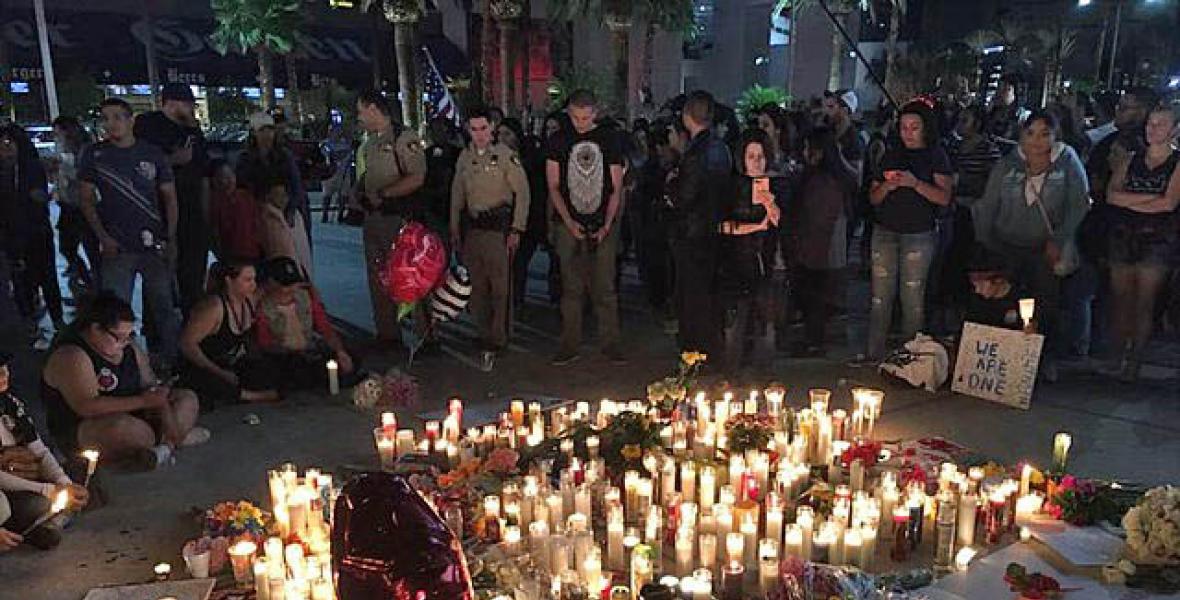The prayerfulness of America following another mass shooting is wondrous to behold. Everyone prays, sends prayers, solicits them — from the Senate floor to ESPN’s afternoon basketball show. I looked diligently for anyone who didn’t pray publicly. I failed. If a gunman sprayed Vatican City, there wouldn’t be as much ostentatious praying.
What a passive society. It embraces action, en principe, and pragmatism versus “theory.” But when an enemy actually strikes — hurricanes or mass murderers — it goes limp and turns to the Lord. They pray because they don’t know anything else to do or believe anything can be done. It’s as if there are only effects, not causes, so action is pointless, therefore let us pray.
Has there ever been a society where everyone yapped so endlessly about God? Even Trump. It was bizarre to hear the word lumber out of his mouth, at the UN. (“We will fight…for the almighty God who made us all. Thank you, God bless you…”) You just know he’s new to this lingo. When he started deploying it, I thought it was merely code for the great lost age of white America: his way of saying Christian, by which he meant white. But he seems more into it now. Post Vegas, he said, “Melania and I have been praying.” You can take that as straight rubbish, but it’s even scarier to picture as real.
The godly maundering hobbles clear thought about the problems, which are obvious to every other society: greenhouse gases, deadly weaponry — as if praying helps you not think, so that when you try, it comes out garbled. After Vegas they lamented the inattention to “warning signs,” such as those guns in the hotel. So hotel housekeepers are the problem? Maybe they should be regulated. Or the shooter’s motive. Who cares? Even if you know, what do you know?
How stupid can showy religiosity make you? On Fox and Friends, co-host Ainsley Earhardt opined: “You know, Steve and Brian…maybe this guy heard ‘God Bless America’…he didn’t believe in God…he knows country musicians or fans are normally pro-God…that could possibly be the reason…” This was followed by the five most silent seconds in TV history. Even Steve Doocy shook his head slowly while Brian Kilmeade stared stonily to camera.
But enough scorn for gaudy religiosity. What truly irks me isn’t that it can render an entire society brainless. It’s that it can deprive a society of possible resources that a less stupid religiosity could provide, even for non-believers.
I happen to be reading a book called The Lonely Man of Faith, written decades ago, by Rabbi Joseph Soloveitchik, the greatest rabbinic scholar of the 20th century. He was known as The Rav. As an undergrad in Boston with strong religious inclinations, I used to borrow a pal’s car and drive into Roxbury where Soloveitchik delivered a public class on Saturday nights. I sat in the back row and never spoke. The front row was occupied by the top students at Harvard Law, who found U.S. jurisprudence a breeze after lifetimes of Talmudic study.
Soloveitchik ordinarily started off from concrete legal questions, then expanded seamlessly into philosophical and existential issues. It was his genius. In the book though, he stares straight at the “loneliness” of the faithful in highly secularized, technological societies, which have “advanced” themselves right to the brink of mass suicide and despair. It’s odd how these attributes probably resonate now even more than back then, when he wrote.
Reverting to scripture, he applies a contrast between the two “Adams” created in the Bible’s first two chapters: one, a creative and domineering creature; the other, vulnerable and isolated. What’s remarkable is his analysis seems pertinent for someone like me, long out of the fold, not just to those still ensconced in religious institutions. That’s what I mean by what’s been lost. But it depends on accepting religion’s fragile, ambiguous status within a complex, technologized modernity. Its reticence and experience of isolation sensitize it.
That acceptance, which amounts to the religious virtue of humility, then becomes a strength. But when you dumb religion down and splash it across the face of social reality, you forego such insights. Where, besides the U.S., do you find that kind of shallow, coercive, praying and braying in the world today? Perhaps in a few faltering communities still under the thumb of Daesh.
This column was first published in the Toronto Star.
Image: C. Mendoza/VOA
Chip in to keep stories like these coming.




